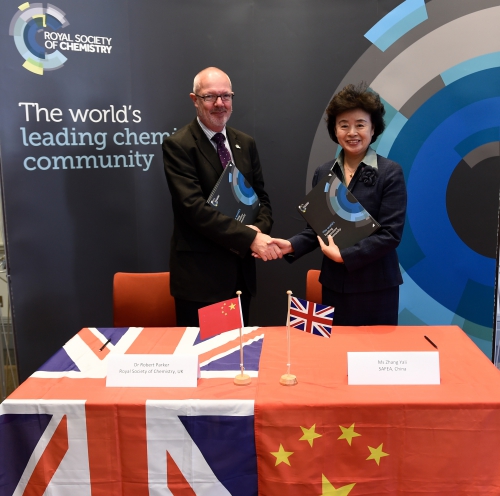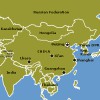Celebrating UK-Chinese chemistry collaboration
10th June 2014, Royal Society of Chemistry, Burlington House, Piccadilly, London.
The Royal Society of Chemistry celebrated the renewal of a cooperation agreement with the State Administration for Foreign Experts Affairs (SAFEA) – a division of the Chinese Government – with an event at Burlington House in London.
As part of a wider Chinese governmental initiative to enhance the global impact of Chinese science and of their higher education institutions, the Royal Society of Chemistry and SAFEA provide funding for a visiting researchers programme.
This encourages academics from the UK to visit Chinese universities to share best practice, advise Chinese researchers on presenting their research to an international audience and to stimulate collaboration between UK and Chinese institutions.
Royal Society of Chemistry president, Professor Lesley Yellowlees, spoke at the event, saying: "If we look back through these five years at how our relationship has developed, there are many outstanding achievements that we can all be proud of.
"As part of the RSC-SAFEA Visiting Researchers Programme, we have arranged 24 visits since 2010. The UK academics on this programme have been wonderful ambassadors for us, showcasing their research and expertise to over 20 Chinese universities and institutions.
"Together our two organisations have been able to bring together many scientists and that has resulted in fruitful collaborations between our countries. Let us look forward to many more in the future.
"As we agree to five further years of collaboration and mutual co-operation, I am very much looking forward to seeing the fantastic outcomes of further joint ventures between our two organisations."

The signing ceremony celebrated the success of the previous five years and sees SAFEA and the RSC commit to continue and strengthen the programme through the renewal of a memorandum of understanding.
Professor Annie Bligh from the University of Westminster was the first UK-based academic to receive funding through the SAFEA and Royal Society of Chemistry partnership and has visited China twice to give lectures at partner universities.
Professor Bligh, who was born in Hong Kong, said: "It’s a huge honour to be involved in this programme. Partnerships between China and the UK are something I've been working on since 2003, especially with young people.
"I talked to a lot of young researchers on my visits to Chinese universities and found it very easy to be around them. I answered a lot of questions and I feel like a role model for them – a lot of them see how they can achieve as a Chinese person in a foreign country.
"I would love to do it again and again. I always have young people around me – I have had six Chinese PhD students in my research group – so it’s good to see them moving on. I really relate to them and the difficulties they have studying in this country. When you’re a researcher abroad you have to adjust to the culture as well as excelling in science."
The event included Frazer Macdonald, Head of Asia-Pacific at the UK Government's Department for Business, Innovation and Skills and Ms Zhang Yali, Deputy Administrator, SAFEA, who signed the Memorandum of Understanding with Royal Society of Chemistry Chief Executive, Dr Robert Parker.
Minister Counsellor of Science and Technology at the Chinese Embassy, Mr Chen Futao, welcomed the renewal of the memorandum of understanding. He said: "I think person-to-person contact is the foundation for good scientific co-operation.
"Last year the UK overtook Japan to become China’s second biggest scientific partner. The Chinese government has chosen an innovation driven development strategy and put a lot of funding into research and development, an annual increase of around 20% in its research budget during the last five years.
"Knowledge and talent are the driving force for innovation. I think SAFEA and the Royal Society of Chemistry’s Memorandum of Understanding is a wonderful channel for person-to-person contact."
Chris Cotton, Director of the China-Britain Business Council added: "The CBBC works at the business end, on how to bring a good idea, good research through to commercialisation, particularly with small and medium sized enterprises.
"We are delighted to extend our congratulations to the Royal Society of Chemistry and SAFEA on the renewal of the MoU for collaboration after a very successful initial five years of operation.
"This is testament to the effectiveness of the programme to date and we at CBBC look forward to continuing to support the ongoing activities of the Royal Society of Chemistry in China wherever we can."
Professor Roy Johnston from the University of Birmingham also spoke about his experiences on the SAFEA/RSC exchange. He said: “In addition to strengthening existing collaborations and initiating new ones, one of the most satisfying aspects of the SAFEA/RSC visit for me was talking with a variety of young people, ranging from high school students to undergraduates and postgraduates.
“In all cases I was impressed with their level of engagement and enthusiasm. I hope that the students and academics I spoke with will have benefitted by learning more about study and research in the UK in general, as well as the frontiers of research in computational nanoscience.”
Dr Vitaliy Khutoryanskiy from the University of Reading said: “It was a fantastic opportunity for me to visit Beijing and Shanghai to catch up with old friends and to establish new collaborative links.
“I am sure these visits will strengthen my collaboration with several institutions in China, which soon will lead to joint publications and more exchange of researchers. I am absolutely grateful to SAFEA-RSC for supporting my visit to China”.
Dr Falko Drijfhout from Keele University added: “My visits to China not only opened the road to new research opportunities but also gave a great insight in their research culture.
“Although the two universities differ quite a bit, I was struck by the eagerness of post-graduate students to carry out their research and how much they showed their appreciation of me coming all the way to visit them.
“Their hospitality during both visits, in Hangzhou and Nanjing, was enormous and made my visits not only unforgettable but wanting to know more about research in other places in China and I even thought about learning Chinese.”

